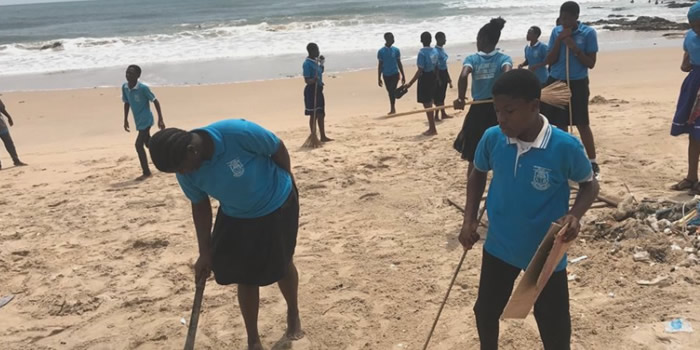Adverts
HEALTH
Kpone residents schooled on ills of water pollution
The Kpone-Katamanso Municipal Office of the Centre for National Culture (CNC) has sensitised residents of the area to desist from polluting water bodies to help achieve the Sustainable Development Goals (SDG) four, eight, and 14.

Date Created : 11/23/2022 12:00:00 AM : Story Author : Laudia Sawer/Ghanadistricts.com
SDG four is aimed at clean water and sanitation, while goals eight and 14 respectively have an objective of achieving decent work and economic growth, and life below water.
The course followed a day’s cleanup exercise at the Laloi beach in Kpone organised by the CNC in collaboration with the Brilliant Souls International School, and the Complementary Education Agency.
Ms. Sandra Boison, the Kpone-Katamanso Municipal Cultural Director told residents around the beach that disposing of waste, and harmful substances into the water bodies would contaminate it and adversely affect its aquatic life.

Ms. Boison reminded the residents that such activities would lead to the extinction of the fishes they relied on from the waterbody for their nutrition needs as well as for economic purposes as currently, some residents depend on it as a source of employment.
She added as people lose their source of livelihood, poverty would increase and to survival, people would resort to social vices, and therefore urged residents to protect the water bodies to prevent such occurrences.
She further said having a clean environment and beach and protecting water bodies would also promote tourism in the area and boost economic activities.
Mr. Zac Abrahams, the Kpone-Katamanso Municipal Director for Complementary Education Agency called for urgent action to find the solution to properly tackle waste materials that end up polluting the land and the ocean.
Mr. Abrahams reiterated that such materials were killing wildlife, damaging ecosystems, clogging drainage systems, and harming fisheries and tourism which he said were key sources of jobs for residents along the beaches.
He added that marine wastes also contributed to climate change worse, and, therefore, called for stakeholder collaboration in solving the problems.
Mr. Benjamin Eshun-Rockson, a teacher at Brilliant Soul International School, on his part noted that the ocean was the largest natural carbon sink for greenhouse gases, and therefore vital to regulating the climate.
Mr. Rockson said, “Rising temperatures break down plastics in the ocean, causing them to release more greenhouse gases like methane and ethylene, which in turn drives up temperatures.”

